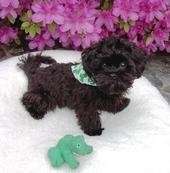Poodle crossbreed
Poodle crossbreeds or poodle hybrids are the offspring of purebred poodles that have been crossbred with another purebred dog breed. They may be described as a mixed breed dog, designer dog, mutt/mongrel, or sometimes as a hybrid dog.
Description and breed history
Normally, poodles are strongly line bred, for a combination of traits such as size and coat colour.[1]
Although the American Kennel Club does not recognize poodle crossbreads[2] because they are technically a hybrid of two pure breeds rather than a new breed. In biological terms, poodle crossbreeds are an intraspecies hybrid, rather than a hybrid between two different species, since all dogs belong to the same species and subspecies, Canis lupus familiaris.
While some crosses are accidental, many crosses are intentionally bred. Among reputable breeders, poodle crossbreeding is an attempt to breed dogs with positive characteristics of two recognized breeds. For example, the Labradoodle was originally bred in an attempt to create a dog with a Labrador temperament and a hypoallergenic poodle coat. The intent was to create guide dogs for people with allergies. However—as with all crosses—only some puppies from crossbreeding of two purebreds will inherit both desired traits; some will inherit one trait and some neither. Even when crossbred dogs manifest dominant traits, these dogs may not pass on the desired traits to offspring. One of these desired traits is the fleece coat of the Standard Poodle.[3] If a puppy has this trait, it is less likely to shed.
While crossbreeding does not guarantee better health, hybrids bred from parents with disparate gene pools may have far lower chances of expressing disorders associated with the parent purebreds. Many good, reputable breeders perform genetic health testing to prove their dogs are not carriers of such diseases, and this helps to produce healthier, disease-free puppies. Breeders who health test and title their dogs usually have the highest quality for a decent price.[4]
See also
References
- Björnerfeldt, Susanne; Hailer, Frank; Nord, Maria; Vilà, Carles (2008). "Assortative mating and fragmentation within dog breeds". BMC Evolutionary Biology. 8: 28. doi:10.1186/1471-2148-8-28. PMC 2266708. PMID 18226210.
- "Dog Breeds - Types Of Dogs". American Kennel Club. Retrieved 2020-06-17.
- "Prize Poodles And Doodles - Online". Prize Poodles and Doodles. Retrieved 2016-10-03.
- P. D. McGreevy & W. F. Nicholas, "Some Practical Solutions to Welfare Problems in Pedigree Dog Breeding", Animal Welfare, 1999, Vol. 8, 329–331. "Hybrids have a far lower chance of exhibiting the disorders that are common with the parental breeds. Their genetic health will be substantially higher." (p. 338)
